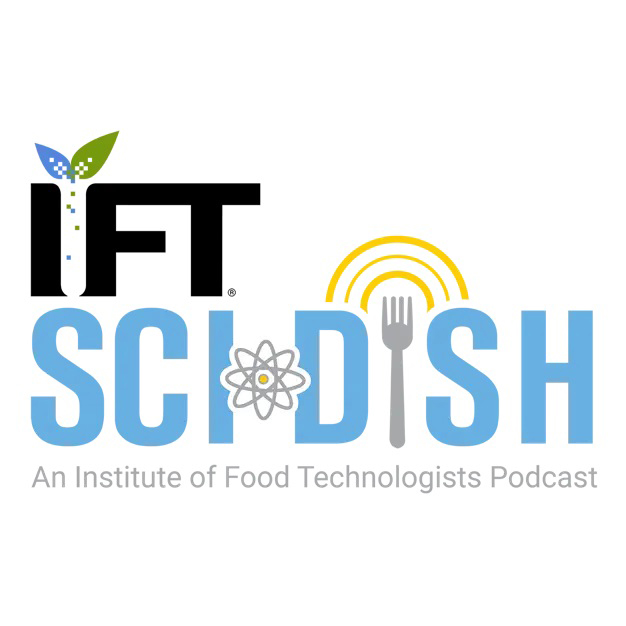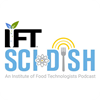EP 24: The Sweet Side of Toxicology
- IFT Sci Dish
- EP 1: Strategies to Communicate
- EP 2: The Changing World of Nutrition
- EP 3: The Fuzzy Front End of Product Development
- EP 4: Consumers Don’t Want to Change, So Why Are They
- EP 5: Flavor is Key
- EP 6 Growth in Food Production Requires “Inside Knowledge”
- EP 7: Microalgae
- EP 8: Pet Food: The Surprising Use of Science
- EP 9: Fresh Produce
- EP 10: Current State of African Swine Fever
- EP 11: The Challenge of Water
- EP 12: A CRISPR Food Future
- EP 13: Hackathon Winners
- EP 14: Cold Plasma
- EP 15: Wellness Flavors
- EP 16: Career Conversations
- EP 17: Barley and the promise of upcycling
- EP 18: Alternative Meat and a More Sustainable Food System
- EP 19: Bird Flu - Sorting Fact from Fiction
- EP 20: Sensory Science Series - “Culinary Quantitative Description Analysis QDA”
- EP 21: Sensory Science Series - “Fast & Early”
- EP 22: Plastic on Your Plate
- EP 23: DEI’s Role in Supporting a Sustainable Food Ecosystem
- EP 24: The Sweet Side of Toxicology
Low and no-calorie artificial sweeteners have a long and controversial history. Originally developed to reduce caloric intake, these sugar substitutes have become a hot topic for consumers. Join host Bruce Perkins and guest experts, Drs. Gavin Thompson, Ray Matula, and Jim Coughlin, as they unravel the intricacies of artificial sweetener safety.
Beginning with a look of what artificial sweeteners are, the experts provide a brief historical overview of key sweeteners, including saccharine, aspartame, sucralose, and stevia, among others, and their presence in our food. Then, they will review the regulatory approval process for artificial sweeteners as food additives/ingredients in the United States. The discussion will conclude with a conversation regarding the assessment of sweeteners for safety vs. studies evaluating their potential health benefits.
By the end of this podcast, you'll gain a deeper understanding of the nature of artificial sweeteners and the complexities of safety evaluation.
Listen and subscribe on Apple Podcasts, Google Podcasts, Spotify, or wherever you listen to podcasts.
Guests
James R. Coughlin, M.S. Ph.D. CFS received his M.S. in Food Science & Technology, Ph.D. in Agricultural & Environmental Chemistry and postdoctoral training in Environmental Toxicology at the University of California, Davis, with a major research focus on heat-processed carcinogens formed during the Maillard Browning Reaction. He is a Certified Food Scientist and Fellow of IFT and was honored in 2020 with IFT’s Bernard Oser Food Ingredient Safety Award. Dr. Coughlin initially worked for 2 years at Armour Foods, then spent 10 years at General Foods and Kraft General Foods in external scientific affairs before undertaking independent consulting in Southern California since 1992. He served numerous times as Chair of IFT’s Toxicology and Safety Evaluation Division and for 17 years as IFT’s Codex Subject Expert on Contaminants in Food. He also served as President of the Association for Science and Information on Coffee and continues as a Board member. He specializes in global safety evaluations, benefit-risk evaluations, risk assessment and risk communication of food additives & contaminants, and health and regulatory issues surrounding coffee/caffeine, nitrate/nitrite/nitric oxide, red/ processed meats and other major food, functional food and dietary supplement products and ingredients.
Ray A. Matulka, Ph.D. is the Director of Toxicology and Executive Vice President at Burdock Group, the leading food safety consulting firm, headquartered in Orlando, FL. Dr. Matulka has more than a decade of experience in the analysis of toxicity data and conducting safety and risk assessments. He earned a doctorate in toxicology from the Medical College of Virginia, and has post-doctoral experience at both Boston University School of Medicine and the University of North Carolina. He has industry experience at the Nebraska Dept. of Environmental Control and as a senior genetic toxicologist at Genesys Research in North Carolina. He is co-author of two book chapters and has authored over 30 publications since obtaining his doctoral degree. Dr. Matulka has experience presenting information to the FDA, USDA and EPA. Among other responsibilities, Dr. Matulka is accountable for the development of consumption analysis and reporting, and offers guidance in strategic scientific business planning and critical decision making to Burdock Group clients in the food and feed ingredient, health and nutrition industries for humans and animals.
Dr. Gavin Thompson characterizes exposures and assesses the safety to humans from substances in food, food processing and packaging components, household and commercial materials, industrial intermediates, consumer products, and drinking water. He advises a broad range of manufacturers, marketers, and industry associations including food ingredient suppliers and processors and packaging manufacturers, basic and specialty chemical suppliers, and consumer and household product producers. He conducts comprehensive exposure and safety assessments, consultations with regulatory agencies, and prepares submissions for pre-manufacturing and pre-market approvals. He conducts incident investigations, designs, supervises, interprets and presents sampling and laboratory analysis results to characterize potential human health risks. He serves as an expert advisor for the determination of generally recognized as safe (GRAS) status for food ingredients; he evaluates potential migration of food-contact substances; he develops product stewardship programs for industrial, food, drug, device, and cosmetic uses of substances; he assesses and assists with compliance of antimicrobial products; and he advises marketers of consumer products regarding appropriate label statements.
Host
Bruce Perkin is the principal scientist and operator of Robust Food Solutions LLC, a food science-based consultancy that has operated since 2017, providing strategic advice and hands-on support to food businesses in the areas of quality systems and food safety, innovation, product development, and organizational design.
Bruce is a Certified Food Scientist, a Certified HACCP practitioner, and is a Certified Manager of Quality and Organizational Excellence through the American Society for Quality. He is also a Preventative Controls Qualified Individual under the FSMA regulations. He has completed Food Defense training through the FDA and the FSPCA. Bruce is a past Chairperson of the Dallas /Fort Worth chapter of IFT, and also a past Chair of the Food Service Division of IFT. In addition, Bruce is a part-time Adjunct Professor at Texas Womens’ University teaching NPD, Food Science and Food Safety to Culinology students.


IFT Sci Dish Podcast
IFT Sci Dish explores science, research, and perspectives from multiple disciplines related to the science of food and food innovation, each aimed at sparking new ideas to ignite innovation in your work and career. Developed by IFT’s topical Divisions, member experts and special guests discuss important topics, challenges, and solutions impacting food science and technology today.




